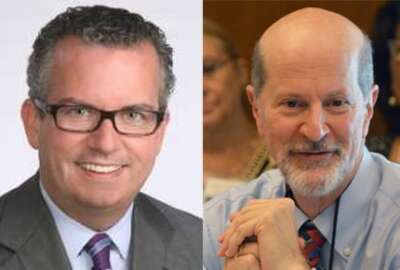
Open-data law walks fine line keeping info ‘as open as possible’
The OPEN Government Data Act requires agencies to appoint a chief data officer to help them develop a comprehensive data inventory the public can access.
Best listening experience is on Chrome, Firefox or Safari. Subscribe to Federal Drive’s daily audio interviews on Apple Podcasts or PodcastOne.
Agencies sitting on a data goldmine will soon have to hire somebody to start digging, under an open-data law President Donald Trump passed last month.
The OPEN Government Data Act, part of the larger Foundations for Evidence-Based Policymaking Act, requires agencies to appoint chief data officers to help them develop a comprehensive data inventory the public can access. The law also sets up a governmentwide CDO council to address common challenges around data access.
Rep. Derek Kilmer (D-Wash.), the OPEN Government Data Act’s original sponsor, whose district includes a large veteran population, said the law would ensure those veterans receive the care they need from the Department of Veterans Affairs.
“We think that it could help lawmakers and the public keep better tabs on wait times and the ability to access VA care in a clinic in our district,” Kilmer said Thursday at the Center for Data Innovation in Washington.
A handful of agencies already have chief data officers, and the Office of Management and Budget outlined many of these open-data provisions in a 2013 memo. But the OPEN Government Data Act, more than anything else, puts the force of law behind these ideas.
Alla Seiffert, the Internet Association’s director of cloud policy and counsel, said the bill will empower agency employees to build an open data culture at their workplaces. However, she warned this culture change won’t happen overnight.
“I’m just particularly sensitive to the fact that this is a very long-term transformation [and] change management effort that is going on throughout government,” Seiffert said. “This is going to, I think, help folks that wanted to move forward move forward even quicker.”
Christian Troncoso, a policy director at BSA and the Software Alliance, said the new law goes beyond what OMB had previously envisioned by requiring agencies to include in their public data inventories any data assets that, as the law states, “would otherwise be made available under” the Freedom of Information Act.
Related Stories

Evidence-based policy bill passage sets stage for upcoming federal data strategy

Opportunity is knocking: Create an evidence-based culture with new policymaking law
Under the President’s Management Agenda, the Trump administration has sought to better commercialize government data. Troncoso said certain agencies, including the National Oceanic and Atmospheric Administration, hold “very valuable” data for the private sector.
“A lot of geospatial data … is going to be really important for many different aspects of machine learning and artificial intelligence development,” he said.
Nick Hart, the director of the Bipartisan Policy Center’s Evidence Project, said the bill gives the public an opportunity to access previously unknown data sets from agencies.
“We don’t know what data government currently has,” Hart said. “This is a fundamental problem for a researcher that’s trying to answer questions that policymakers want answers to.”
Under the original 2013 OMB memo, Hart added that agencies made a “solid attempt” to stand up a comprehensive data inventory, but bureaucratic silos prevented agencies from uploading certain data sets.
“The Census Bureau, for example, has some data that they received from other agencies. The other agencies may not have reported it on their inventory because they gave it to the Census Bureau, [and] the Census Bureau didn’t report it because it wasn’t their data,” he said. “This is a really unique opportunity to fix what’s kind of a silly problem, and to be totally honest, we can solve this.”
Unlike chief information officers, charged with overseeing IT systems, the chief data officer role will focus on improving data quality and data management.
“When data have low quality, they have limited utility,” Hart said. “So I think the CDOs are going to have a really instrumental role in just changing the nature of the kinds of data that we’re collecting.”
Nick Shockey, the director of programs and engagement at the Scholarly Publishing and Academic Resources Coalition, said the OPEN Government Data Act requires agencies to walk a fine line between making data “as open as possible, but as closed as necessary.”
Under the Confidential Information Protection and Statistical Efficiency Act, part of the 2002 E-Government Act, employees at statistical agencies like the Census Bureau face strict rules for protecting personally identifiable information.
Improper disclosure of data under the law carries a maximum penalty of five years in prison, a $250,000 fine, or both.
“There’s a reason why in our federal statistical agencies, you don’t hear about misuses of data,” Hart said. “It’s because they have built a culture of being very protective of the data that they hold that have a lot of sensitive information attached to them.
Copyright © 2024 Federal News Network. All rights reserved. This website is not intended for users located within the European Economic Area.
Jory Heckman is a reporter at Federal News Network covering U.S. Postal Service, IRS, big data and technology issues.
Follow @jheckmanWFED



